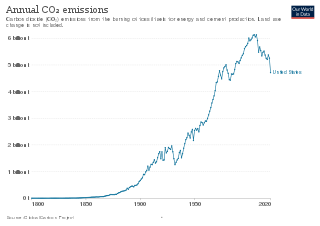
The National Academies of Sciences, Engineering, and Medicine (NASEM), also known as the National Academies, is a congressionally chartered organization that serves as the collective scientific national academy of the United States. The name is used interchangeably in two senses: (1) as an umbrella term or parent organization for its three sub-divisions that operate as quasi-independent honorific learned society member organizations known as the National Academy of Sciences (NAS), the National Academy of Engineering (NAE), and the National Academy of Medicine (NAM); and (2) as the brand for studies and reports issued by the unified operating arm of the three academies originally known as the National Research Council (NRC). The National Academies also serve as public policy advisors, research institutes, think tanks, and public administration consultants on issues of public importance or on request by the government.

The U.S. Government Accountability Office (GAO) is an independent, nonpartisan government agency within the legislative branch that provides auditing, evaluative, and investigative services for the United States Congress. It is the supreme audit institution of the federal government of the United States. It identifies its core "mission values" as: accountability, integrity, and reliability. It is also known as the "congressional watchdog". The agency is headed by the Comptroller General of the United States. The comptroller general is appointed by the president with the advice and consent of the Senate. When a vacancy occurs in the office of the comptroller general, Congress establishes a commission to recommend individuals to the president. The commission consists of the following:
The National Climate Assessment (NCA) is an initiative within the U.S. federal government focused on climate change science, formed under the under the auspices of the Global Change Research Act of 1990.

The Federal Information Security Management Act of 2002 is a United States federal law enacted in 2002 as Title III of the E-Government Act of 2002. The act recognized the importance of information security to the economic and national security interests of the United States. The act requires each federal agency to develop, document, and implement an agency-wide program to provide information security for the information and information systems that support the operations and assets of the agency, including those provided or managed by another agency, contractor, or other source.

The Office of Technology Assessment (OTA) was an office of the United States Congress that operated from 1974 to 1995. OTA's purpose was to provide congressional members and committees with objective and authoritative analysis of the complex scientific and technical issues of the late 20th century, i.e. technology assessment. It was a leader in practicing and encouraging delivery of public services in innovative and inexpensive ways, including early involvement in the distribution of government documents through electronic publishing. Its model was widely copied around the world.
The Climate Change Science Program (CCSP) was the program responsible for coordinating and integrating research on global warming by U.S. government agencies from February 2002 to June 2009. Toward the end of that period, CCSP issued 21 separate climate assessment reports that addressed climate observations, changes in the atmosphere, expected climate change, impacts and adaptation, and risk management issues. Shortly after President Obama took office, the program's name was changed to U.S. Global Change Research Program (USGCRP) which was also the program's name before 2002. Nevertheless, the Obama Administration generally embraced the CCSP products as sound science providing a basis for climate policy. Because those reports were mostly issued after the Fourth Assessment Report of the Intergovernmental Panel on Climate Change (IPCC), and in some cases focused specifically on the United States, they were generally viewed within the United States as having an importance and scientific credibility comparable to the IPCC assessments for the first few years of the Obama Administration.
Frederick Steven "Rick" Piltz was a former senior associate in the U.S. Climate Change Science Program. In March 2005, he resigned over political interference in the program's climate change reports. In June 2005, the New York Times exposed the role of Philip Cooney in editing government documents on climate change to create an appearance of scientific uncertainty. A former lobbyist with the American Petroleum Institute, Cooney resigned and days later took a job at Exxon Mobil.

The environmental policy of the United States is a federal governmental action to regulate activities that have an environmental impact in the United States. The goal of environmental policy is to protect the environment for future generations while interfering as little as possible with the efficiency of commerce or the liberty of the people and to limit inequity in who is burdened with environmental costs. As his first official act bringing in the 1970s, President Richard Nixon signed the U.S. National Environmental Policy Act (NEPA) into law on New Years Day, 1970. Also in the same year, America began celebrating Earth Day, which has been called "the big bang of U.S. environmental politics, launching the country on a sweeping social learning curve about ecological management never before experienced or attempted in any other nation." NEPA established a comprehensive US national environmental policy and created the requirement to prepare an environmental impact statement for “major federal actions significantly affecting the quality of the environment.” Author and consultant Charles H. Eccleston has called NEPA the world's “environmental Magna Carta”.
The United States Global Change Research Program (USGCRP) coordinates and integrates federal research on changes in the global environment and their implications for society. The program began as a presidential initiative in 1989 and was codified by Congress through the Global Change Research Act of 1990, which called for "a comprehensive and integrated United States research program which will assist the Nation and the world to understand, assess, predict, and respond to human-induced and natural processes of global change."
The climate change policy of the United States has major impacts on global climate change and global climate change mitigation. This is because the United States is the second largest emitter of greenhouse gasses in the world after China, and is among the countries with the highest greenhouse gas emissions per person in the world. In total, the United States has emitted over a trillion metric tons of greenhouse gasses, more than any country in the world.

The Arctic policy of the United States is the foreign policy of the United States in regard to the Arctic region. In addition, the United States' domestic policy toward Alaska is part of its Arctic policy.

The Special Inspector General for Afghanistan Reconstruction (SIGAR) is the U.S. government's leading oversight authority on Afghanistan reconstruction. Congress created the Office of the Special Inspector General for Afghanistan Reconstruction to provide independent and objective oversight of the Afghanistan Reconstruction funds. Under the authority of Section 1229 of the National Defense Authorization Act for Fiscal Year 2008, SIGAR conducts audit, inspections, and investigations to promote efficiency and effectiveness of reconstruction programs, and to detect and prevent waste, fraud, and abuse of taxpayer dollars. SIGAR also has a hotline that allows individuals to report suspected fraud.
The climate change policy of the United States under the presidency of George W. Bush differed from Bush's promises on the campaign trail to regulate carbon dioxide emissions from power plants: within two months of taking office he walked away from his commitment.

Tan Sri Zakri bin Abdul Hamid has had a distinguished career in science as a researcher, educator, administrator and diplomat.

Nuclear Non-Proliferation Act of 1978, 22 U.S.C. § 3201, is a United States federal law declaring that nuclear explosive devices pose a perilous threat to the security interests of the United States and continued international progress towards world peace and the development of nations.

The Digital Accountability and Transparency Act of 2014 is a law that aims to make information on federal expenditures more easily accessible and transparent. The law requires the U.S. Department of the Treasury to establish common standards for financial data provided by all government agencies and to expand the amount of data that agencies must provide to the government website, USASpending. The goal of the law is to improve the ability of Americans to track and understand how the government is spending their tax dollars.

The Revitalize American Manufacturing and Innovation Act of 2013 is a bill that would establish the Network for Manufacturing Innovation Program (NMIP) within the National Institute of Standards and Technology (NIST). Under the program, NIST would award grants to establish a network of centers of innovation to improve the competitiveness of domestic manufacturers.

Nuclear Safety, Research, Demonstration, and Development Act of 1980, 42 U.S.C. § 9701, established nuclear safety policy for nuclear power plants supplying electric energy and electricity generation within the United States. The Act authorized a five-year demonstration program simulating conditions with light water nuclear reactors for the observation of control monitoring and phases of operation for nuclear reactor cores. The U.S. Department of Energy was authorized by the Act of Congress to conduct the nuclear reactor demonstration study while establishing a reactor engineering simulator facility at a United States national laboratory. The nuclear safety demonstration program was to provide research data regarding reactor design and simplification improvements given thermal power station simulations subjecting nuclear reactors to hypothesized calamity and customary operating conditions.

Earthquake Hazards Reduction Act of 1977 is a statute formulating a national policy to diminish the perils of earthquakes in the United States. The Act of Congress is a declaration for an earthquake prediction system, national earthquake hazards reduction program, and seismological research studies. The United States public law authorizes States assistance through the provisions of the Disaster Relief Act of 1974.
Fourth National Climate Assessment (NCA4) 2017/2018 is a 1,500 page two-part congressionally mandated report by the U.S. Global Change Research Program (USGCRP)—the first of its kind by the Trump administration, who released the report on November 23, 2018. The climate assessment process, with a report to be submitted to Congress every four years, is mandated by law through the Global Change Research Act of 1990. The report, which took two years to complete, is the fourth in a series of National Climate Assessments (NCA) which included NCA1 (2000), NCA2 (2009), and NCA3 (2014).










